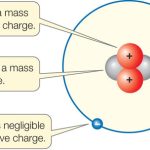Welcome to this discussion on whether an EMF reader can detect nuclear radiation. Nuclear radiation is a type of energy that is released by the unstable nucleus of an atom. EMF readers, on the other hand, are devices that measure electromagnetic fields. In this discussion, we will explore whether an EMF reader is capable of detecting nuclear radiation and the limitations of these devices when it comes to detecting this type of energy. Let’s dive in!
Contents
The Basics of EMF Readers
Electromagnetic Field (EMF) readers are devices that measure the level of electromagnetic radiation in a particular area. They are commonly used to detect the presence of electromagnetic waves generated by electronic devices such as mobile phones, microwaves, and Wi-Fi routers. The readings are usually displayed in milliGauss (mG) or microTesla (μT), which are units used to measure the strength of the electromagnetic field.
What is Nuclear Radiation?
Nuclear radiation is the energy emitted by the nuclei of atoms as they undergo radioactive decay. It is a form of ionizing radiation that can cause damage to living cells by breaking chemical bonds in DNA molecules, leading to mutations and potentially cancerous growths. Nuclear radiation can be released naturally from the earth, or it can be produced artificially by nuclear power plants, nuclear weapons, and medical procedures such as X-rays.
EMF readers are not capable of detecting nuclear radiation as they are designed to measure electromagnetic radiation, which differs from nuclear radiation. Different types of detectors, such as Geiger counters and dosimeters, are used to measure nuclear radiation. It is crucial to be aware of the dangers of radiation exposure and take precautions to minimize it. Methods to detect nuclear radiation include using a Geiger counter or a dosimeter.
The short answer is no. EMF readers are not designed to detect nuclear radiation. The reason for this is that nuclear radiation is a different type of energy than electromagnetic radiation. While both types of radiation can be harmful to living organisms, they have different properties and require different types of detectors to measure them.
EMF readers are devices that measure electromagnetic radiation and are not designed to detect nuclear radiation. Different types of detectors, such as Geiger counters and dosimeters, are required to measure the specific types of radiation emitted by radioactive materials. It is important to be aware of the dangers of radiation exposure and to monitor radiation levels in the environment to minimize exposure. Geiger counters and dosimeters are common methods used to detect nuclear radiation.
Types of Radiation
There are three main types of nuclear radiation: alpha, beta, and gamma. Alpha particles are the heaviest and slowest of the three, and they can be stopped by a sheet of paper or the outer layer of skin. Beta particles are lighter and faster, and they can penetrate deeper into the body. Gamma rays are the most energetic and penetrating of the three, and they can pass through several inches of lead or concrete.
EMF readers are not designed to detect nuclear radiation, which requires a specialized detector to measure the specific types of radiation emitted by radioactive materials. While there are many types of detectors available to measure nuclear radiation, Geiger counters and dosimeters are the most commonly used by scientists, emergency responders, and radiation workers to monitor levels of radioactivity in the environment. It is important to be aware of the dangers of radiation exposure and take precautions to minimize exposure, as exposure to nuclear radiation can cause a range of health problems, including cancer, genetic mutations, and radiation sickness.
Detectors for Nuclear Radiation
There are several types of detectors that can be used to measure nuclear radiation. Geiger counters, for example, use a gas-filled tube to detect the ionizing radiation produced by nuclear decay. They are commonly used by scientists, emergency responders, and radiation workers to monitor levels of radioactivity in the environment.
Another type of detector is the dosimeter, which measures the amount of radiation absorbed by a person over a period of time. Dosimeters are commonly used by medical professionals who work with X-rays or other forms of ionizing radiation.
Misconceptions about EMF Readers and Nuclear Radiation
There are many misconceptions about the ability of EMF readers to detect nuclear radiation. Some people assume that because EMF readers can detect radiation from electronic devices, they can also detect nuclear radiation. However, this is not the case. Nuclear radiation requires a specialized detector that can detect the specific types of radiation emitted by radioactive materials.
The Importance of Radiation Detection
While EMF readers cannot detect nuclear radiation, it is still important to be aware of the dangers of radiation exposure. Exposure to nuclear radiation can cause a range of health problems, including cancer, genetic mutations, and radiation sickness. It is important to monitor radiation levels in the environment and take precautions to minimize exposure.
How to Detect Nuclear Radiation
If you are concerned about exposure to nuclear radiation, there are several ways to detect it. One of the most common methods is to use a Geiger counter, which detects ionizing radiation by measuring the number of ionizing particles that pass through a gas-filled chamber. Another method is to use a dosimeter, which measures the amount of radiation absorbed by the body over a period of time.
FAQs: Can an EMF Reader Detect Nuclear Radiation?
What is an EMF reader?
An EMF reader is an electronic device that measures electromagnetic fields. It is commonly used to detect and measure the strength of electromagnetic radiation emitted from various sources, including mobile phones, microwaves, and power lines.
Can an EMF reader detect nuclear radiation?
No, an EMF reader cannot detect nuclear radiation. EMF readers are designed specifically to measure electromagnetic radiation, which is different from nuclear radiation. Nuclear radiation, also known as ionizing radiation, is the energy released by atoms as a result of nuclear reactions. This energy can take the form of particles or waves and can penetrate materials that block electromagnetic radiation.
What devices can detect nuclear radiation?
Devices that can detect nuclear radiation include Geiger counters, ionization chambers, and dosimeters. These devices are designed specifically to detect and measure ionizing radiation. Geiger counters, for example, work by detecting the ionization of a gas within a detector. When ionizing radiation interacts with the gas, it produces an electrical signal that can be amplified and measured.
Why is it important to detect nuclear radiation?
Nuclear radiation can be harmful to human health and the environment. It can cause damage to cells and genetic material, leading to cancer and other illnesses. Detecting nuclear radiation is essential for ensuring the safety of nuclear power plants, nuclear waste storage facilities, and medical facilities that use radiation in their treatments. It is also important for detecting and responding to nuclear emergencies, such as a nuclear accident or terrorist attack.
How can I protect myself from nuclear radiation?
The best way to protect yourself from nuclear radiation is to avoid exposure. This can be achieved by minimizing your time around sources of radiation and increasing the distance between yourself and the source. Shielding yourself with materials that block radiation, such as concrete or lead, can also be effective. In the event of a nuclear emergency, following emergency procedures and evacuation orders is essential for ensuring your safety.







